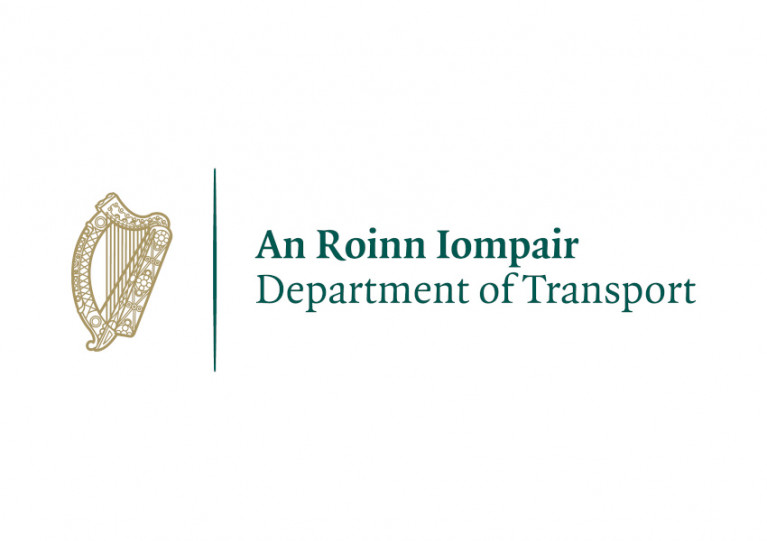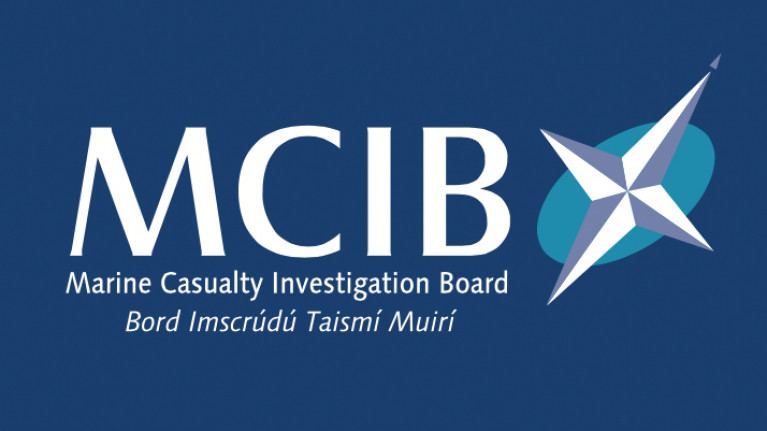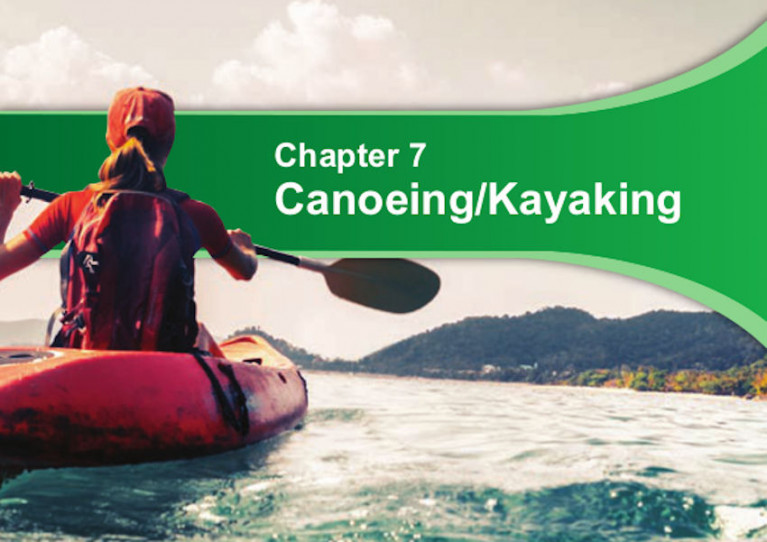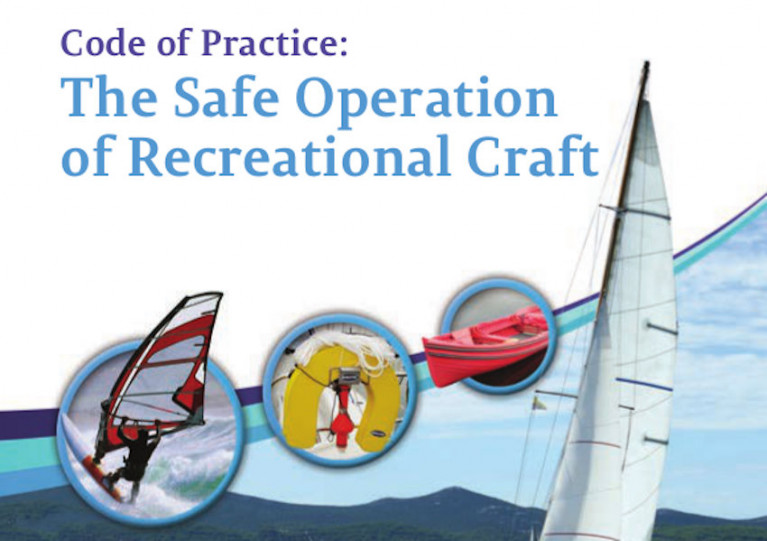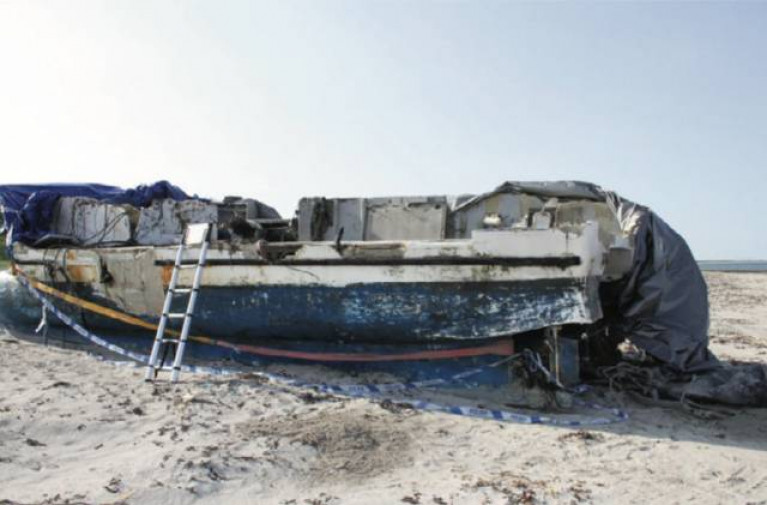Displaying items by tag: Code of Practice
Deadline Extended in Public Consultation on Code of Practice for the Safe Operation of Recreational Craft
The deadline for submissions in the public consultation on a review of the Code of Practice for the Safe Operation of Recreational Craft has been extended to 5pm on Friday 9 December.
As previously reported on Afloat.ie, the Department of Transport reached out to stakeholders in the marine sector last month as it begins the process to review the Code of Practice, the latest edition of which was published in 2017.
The Code of Practice provides information on the legislation that applies to recreational craft, as well as safety information, advice and best-practice guidance for owners, operators and users of a range of recreational craft operating in Irish coastal and inland waters.
It’s proposed that the review will look at the content, structure and design of the Code, including at ways to improve the understanding of the content for end users, both in terms of presentation and layout.
For more details, see Marine Notice No 75 of 2022 (Amended) which is attached below.
Department of Transport Seeking Stakeholder Input in Process to Review Code of Practice for the Safe Operation of Recreational Craft
Afloat.ie has learned that the Department of Transport is reaching out to stakeholders in the marine sector as it begins the process to review the Code of Practice for the Safe Operation of Recreational Craft.
The latest edition of the Code of Practice was published in 2017 and the department says it is now starting a review process to take into account legislative and other developments in recent years.
The Code of Practice provides information on the legislation that applies to recreational craft, as well as safety information, advice and best-practice guidance for owners, operators and users of a range of recreational craft operating in Irish coastal and inland waters.
It’s proposed that the review will look at the content, structure and design of the Code, including at ways to improve the understanding of the content for end users, both in terms of presentation and layout.
In line with a Core Objective of the 2021-2025 Irish Maritime Directorate Strategy, to “Enhance Maritime Safety”, the department is also exploring ways of increasing awareness of the existence of the Code of Practice and invites suggestions in that regard.
The department has prepared a list of questions that is is distributing to stakeholders to encourage their input, and submissions are due by close of business on Wednesday 30 November.
Update 5 November: The Department of Transport has published a Marine Notice announcing the public consultation with an appendix providing more details.
Marine Notice No 14 of 2022 advises that the Department of Transport has published a new revision of its Code of Practice for Small Fishing Vessels.
The Code of Practice sets the standards of safety and protection for all persons on board small fishing vessels, of less than 15 metres length overall, which are required to have a sea-fishing boat licence.
It is based on the voluntary instruments on safety at sea, jointly published by the Food and Agriculture Organization of the United Nations (FAO), the International Labour Organization (ILO), and the International Maritime Organization (IMO).
The new revision refreshes the presentation of the previous revision, updates its references to legislation and Marine Notices and incorporates many safety improvements which have been derived from recommendations of the Marine Casualty Investigation Board, as well as from the department’s Maritime Safety Strategy (2015) and the Report of the Working Group on Safety, Training & Employment in the Irish Fishing Industry (2015).
Finally, the new revision has taken into account the responses that were received to the public consultation on the draft Code of Practice, which took place in November-December 2021.
The Code of Practice is available from the Department of Transport website. Alternatively, you may request either an electronic or printed copy by sending an email to [email protected].
The most recent listing of the approved Panel of Surveyors and their contact details is available from the department’s website, and also in Marine Notice No 01 of 2021, or from the Marine Survey Office at [email protected].
Consultation on Revised Code of Practice for Small Fishing Vessels
The Department of Transport has opened a public consultation as it prepares to publish a revision of its Code of Practice for Small Fishing Vessels.
This Code of Practice sets the standards of safety and protection for all persons on board small fishing vessels, of less than 15 metres length overall, which go to sea to fish for profit.
The text has been prepared to serve as the relevant Code of Practice for section 4(9)(c) of the Fisheries (Amendment) Act 2003 (No. 21 of 2003) (as inserted by section 97 of the Sea-Fisheries and Maritime Jurisdiction Act 2006 (No. 8 of 2006)).
The Code of Practice deals with the vessel construction, its machinery, equipment and stability, and its correct operation, so that safety standards are maintained — and contains mandatory requirements in addition to recommendations.
It is anticipated that the new version will apply from 1 January 2022 and interested parties are now invited to provide comments on the latest revised version, which can be downloaded from Gov.ie.
Observations should be made to the Maritime Safety Policy Division at [email protected] by close of business on Monday 6 December.
As the summer boating season approaches its height, the Department of Transport has issued a reminder to all masters, owners and users of pleasure vessels and recreational craft to familiarise themselves with the Code of Practice for the Safe Operation of Recreational Craft.
The Code of Practice is a valuable source of information, advice and best practice operational guidance for a range of pleasure and recreational craft operating in Irish coastal and inland waters.
It highlights the importance of personal responsibility for all those who take to the water. Each person must take maritime safety seriously, prepare and plan for a safe trip, behave responsibly on the water and be properly equipped so as to be able to respond to any incidents that may arise.
Contained within it is information on legislative requirements, safe operation and advice on best practice when using a range of recreational craft including:
- Sail and motor boats
- Sailing dinghies
- Personal watercraft (jetskis)
- Powerboats
- Canoes and kayaks
- Rowing boats
- Charter boats
- Ski boats and dive boats
- Windsurfing boards, stand-up paddle boards and other non-powered craft
The Code of Practice for the Safe Operation of Recreational Craft is available as a free download from Gov.ie and can also be requested in hard copy, in both English and Irish, from [email protected] or 01 678 3434.
Owners and operators of recreational craft should familiarise themselves with Part A of the Code, the particular chapter in Part B appropriate to their type of vessel, as well as chapters 10, 11 and the appendices.
Further details can be found in Marine Notice No 40 of 2021, which can be downloaded below.
New Panel of Surveyors to Ensure Compliance with Code or Practice for Small Fishing Vessels
The Department of Transport has re-established a panel of surveyors to conduct surveys of small fishing vessels of less than 15m for compliance with the relevant Code of Practice, which was recently under review.
The panel was established three weeks ago on Wednesday 23 December and will continue until 22 December 2023. Contact details for all six panelists are included in Marine Notice No 01 of 2021, a PDF of which is available to download below.
Drowning Incidents Prompt Marine Notice Highlighting Dangers of Boating Single-Handed & Without Lifejacket
The latest Marine Notice from the Department of Transport draws attention to the Code of Practice for the Safe Operation of Recreational Craft, following two recent reports from the Marine Casualty Investigation Board (MCIB).
In October, the MCIB’s report into the death of a long West Cork fisherman 12 months previously suggested that he may have fallen overboard from this open-deck vessel.
As previously reported on Afloat.ie, the MCIB determined that 23-year-old Kodie Healy was not wearing a lifejacket or personal flotation device (PFD) prior to the indecent in Dunmanus Bay on 9 October 2019 — and he may not have been aware of a personal locator beacon on his vessel.
September’s report into an incident on Lough Mask in March 2019 also found that the individual involved was not wearing a lifejacket.
The MCIB was unable to establish the cause of the incident on 8 March in which the 78-year-old experienced angler drowned. But the fact his boat was found upright suggests he had fallen overboard and was unable to get back into his boat.
Marine Notice No 58 of 2020 (available to download below) highlights to all operators of recreational craft the important of abiding by legal requirements to wear a PFD while on board an open craft (or on the deck of decked craft) under seven meres in length.
As well as reminding boaters to ensure they check current weather forecasts and sea/lake/river conditions prior to departure, the notice also underscores the increased risks involved in single-handed boating.
Boaters should carry out a risk assessment to minimise the inherent risks involved when setting out single-handed without any colleagues to help or raise the alarm when in difficulty.
The Code of Practice is a free download from the Department of Transport website. Hard copies are also available on request, in both English and Irish, from the Marine Safety Policy Division at [email protected]
Canoeists & Kayakers Encouraged To Review Code Of Practice
Canoeists, kayakers and relevant organisations are encouraged to review the Code of Practice for the Safe Operation of Recreational Craft, following a recent report into the death of a kayaker on Lough Gill.
As previously reported on Afloat.ie, the lone kayaker was believed to have become separated from his Canadian canoe in bad weather on the Co Sligo lough in late January 2019.
The vessel had not grablines to aid recovery after the casualty had entered the water, the MCIB report said, adding that he may have been weighed down by his Wellington boots, and had only a mobile phone and no other means of signalling for help.
The report recommended a Marine Notice highlighting the requirements for kayaks and canoes as set out in Chapter 7 of the Code, and in particular the following:
- Chapter 7, Section 7.1 (Training), page 84 of the Code: Undertake a recognised training course in the correct use of the specific type of canoe you wish to use.
- Chapter 7, Section 7.2 (Prior to entering the water), pages 84 and 85 of the Code: Ensure that you carry a mobile phone or Marine VHF radio in a suitable watertight cover for use to summon assistance in emergency situations.
- Check the hull is fitted with grab loops/towing lines.
- Ensure that you are a competent swimmer and capable of surviving in the areas you operate.
The MCIB also recommends that canoeists and kayakers should ensure that they wear clothing and footwear that will not affect their chance of survival in the water.
In addition, Chapter 7 of the Code of Practice contains general information on personal safety equipment, sea kayaking, river kayaking and canoeing.
Part A of the Code outlines the legislative requirements that apply to all recreational craft or specific types or size of craft, and Part B contains recommended guidelines and best practice for the safe operation of a range of recreational craft including canoes and kayaks.
The Code of Practice is a free document and hard copies can be obtained on request, in both English and Irish, from the Maritime Safety Policy Division at
[email protected]
The Code and individual chapters of the Code are available to view or download from dttas.gov.ie and a list of updates to the 2017 edition of the Code is also available.
Marine Notice No 30 of 2020 is available to download below, as is Chapter 7 of the Code of Practice.
Owners and users of a range of pleasure and recreational craft in Irish waters are reminded to keep up to date with the Code of Practice for their safe operation.
The Code highlights the importance of personal responsibility for all those who take to the water.
Each person must take maritime safety seriously, prepare and plan for a safe trip, behave responsibly on the water and be properly equipped so as to be able to respond to any incidents that may arise.
The Code is intended for use by owners, operators and users of all pleasure and recreational craft operating in Irish coastal and inland waters and certain Irish vessels operating offshore, including:
- Sail and motor boats
- Sailing dinghies
- Personal watercraft (eg jet skis)
- Powerboats
- Canoes and kayaks
- Rowing boats
- Charter boats
- Ski boats and dive boats
- Windsurfers, stand-up paddleboard users and other non-powered craft
It contains information on legislative requirements, safe operation and advice on best practice when using a recreational craft.
The Code of Practice was most recently updated in late 2019. The free document is available to download from Gov.ie but hardcopies can be obtained on request, in both English and Irish, from the Maritime Safety Policy Division of the Department of Transport, Tourism and Sport at [email protected]
For more details on the Code, see Marine Notice No 27 of 2020, a PDF of which is attached below.
The Department of Transport, Tourism and Sport has issued an amendment related to stability requirements in the Code of Practice for Small Fishing Vessels of less than 15m length overall.
The Code of Practice is currently under review, and a revised version will issue later in the year. In the meantime, boat operators are advised in a new Marine Notice to note the change in procedure with regard to measure the stability of small fishing vessels, which will take effect immediately.
In essence, it clarifies that existing vessels (keels laid prior to 1 May 2004) undergoing both a roll test as described in Annex 1 and inclining experiment as per the provisions of Annex 7 for new vessels (after 1 May 2004), but are not required to comply with both tests.
Where the “strongly recommended” stability standards described in Annex 7 are not applied, then the vessel shall be subjected to a roll test as described in Annex 1, with the vessel in ‘normal departure port condition’ and typical ‘arrive port condition’.
Marine Notice No 23 of 2020 is available to download below.

